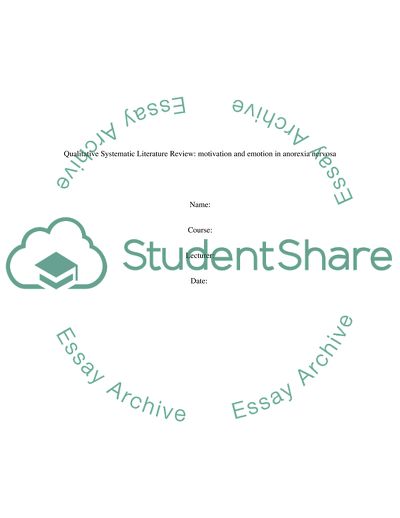Cite this document
(Qualitative Systematic: Motivation and Emotion in Anorexia Nervosa Literature review Example | Topics and Well Written Essays - 2500 words, n.d.)
Qualitative Systematic: Motivation and Emotion in Anorexia Nervosa Literature review Example | Topics and Well Written Essays - 2500 words. https://studentshare.org/psychology/1817835-qualitative-systematic-literature-review-research-paper
Qualitative Systematic: Motivation and Emotion in Anorexia Nervosa Literature review Example | Topics and Well Written Essays - 2500 words. https://studentshare.org/psychology/1817835-qualitative-systematic-literature-review-research-paper
(Qualitative Systematic: Motivation and Emotion in Anorexia Nervosa Literature Review Example | Topics and Well Written Essays - 2500 Words)
Qualitative Systematic: Motivation and Emotion in Anorexia Nervosa Literature Review Example | Topics and Well Written Essays - 2500 Words. https://studentshare.org/psychology/1817835-qualitative-systematic-literature-review-research-paper.
Qualitative Systematic: Motivation and Emotion in Anorexia Nervosa Literature Review Example | Topics and Well Written Essays - 2500 Words. https://studentshare.org/psychology/1817835-qualitative-systematic-literature-review-research-paper.
“Qualitative Systematic: Motivation and Emotion in Anorexia Nervosa Literature Review Example | Topics and Well Written Essays - 2500 Words”. https://studentshare.org/psychology/1817835-qualitative-systematic-literature-review-research-paper.


